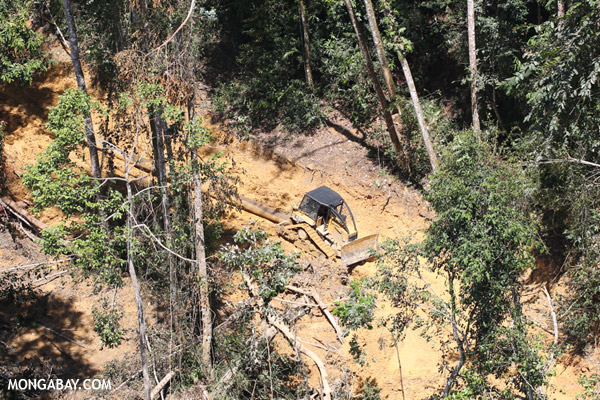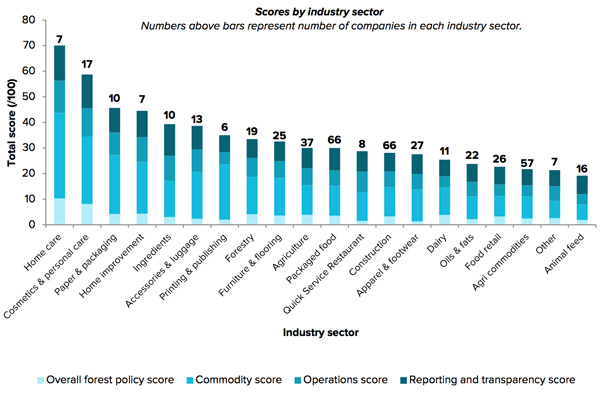Zero deforestation yet to go mainstream

Deforestation for woodpulp production in Sumatra, Indonesia
While a number of high profile companies have adopted policies designed to exclude deforestation from their commodity supply chains, such commitments remain outside the norm, indicating that most companies still lack forest-friendly safeguards, finds a comprehensive survey conducted by the Global Canopy Programme.
The assessment, dubbed The Forest 500′, ranks 250 companies, 50 jurisdictions, 150 banks and investors, and 50 ‘powerbrokers’ by the extent and scope of their souring policies for six ‘forest risk commodities’: soy palm oil, beef, leather, timber, pulp and paper.
The Global Canopy Programme says the aim of the initiative is to improve accountability across key commodity sectors that are responsible for driving the bulk of global deforestation.
“We are currently all part of a global deforestation economy. Deforestation is in our chocolate and our toothpaste, our animal feed and our textbooks, our buildings and our furniture, our investments and our pensions,” said Mario Rautner, The Global Canopy Programme’s Drivers of Deforestation Programme Manager, in a statement. “Our goal with the Forest 500 is to provide precise and actionable information to measure the progress of society to achieve zero deforestation. Together, these 500 countries, companies and investors have the power to clean up global supply chains and virtually put an end to tropical deforestation.”

Forest degradation by logging in Malaysian Borneo
Broadly ‘Forest 500’ finds that larger, consumer-facing companies with strong brand recognition are doing a better job cleaning up their supply chains than smaller firms and companies whose primary customers aren’t mass-market consumers.
Companies in China, India, Russia, and the Middle East rank the worst. Publicly-listed companies generally score better than privately-held companies.
A handful of companies scored the maximum number of points: Groupe Danone (France), Kao Corp. (Japan), Nestle S. A. (Switzerland), Procter & Gamble (US) and Reckitt Benckiser Group (UK), Unilever (UK) and HSBC (UK). Among forest countries, Latin America scored higher than other regions.
Financial institutions generally lagged other sectors, according to the analysis.

Deforestation for palm oil production in Aceh, Indonesia
The Global Canopy Programme says the recent trend of big companies adopting zero deforestation policies is an important first step toward meeting pledges to cut forest loss by 2020, including last year’s New York Declaration on Forests which aims to halve deforestation and the “zero net deforestation by 2020” target set by the Consumer Goods Forum (CGF) in 2010. But it warns that unless more companies jump on the bandwagon, these targets will be missed. Furthermore, the group says companies that have made commitments will have to transition from talk to action.
“Though the Forest 500 findings highlight that much work needs to be done, the good news is that a number of big players across sectors are demonstrating the leadership that is needed,” said Rautner. “Putting policies in place is just the necessary first step in addressing tropical deforestation and their implementation will be critical in order to transition to deforestation free supply chains by 2020.”


GCP REPORTS
- Analysis: companies – Measuring progress to zero deforestation
- Analysis: forest and trading jurisdictions – Measuring progress to zero deforestation
- Analysis: investors – Measuring progress to zero deforestation
- Executive Summary of the Forest 500 Analysis